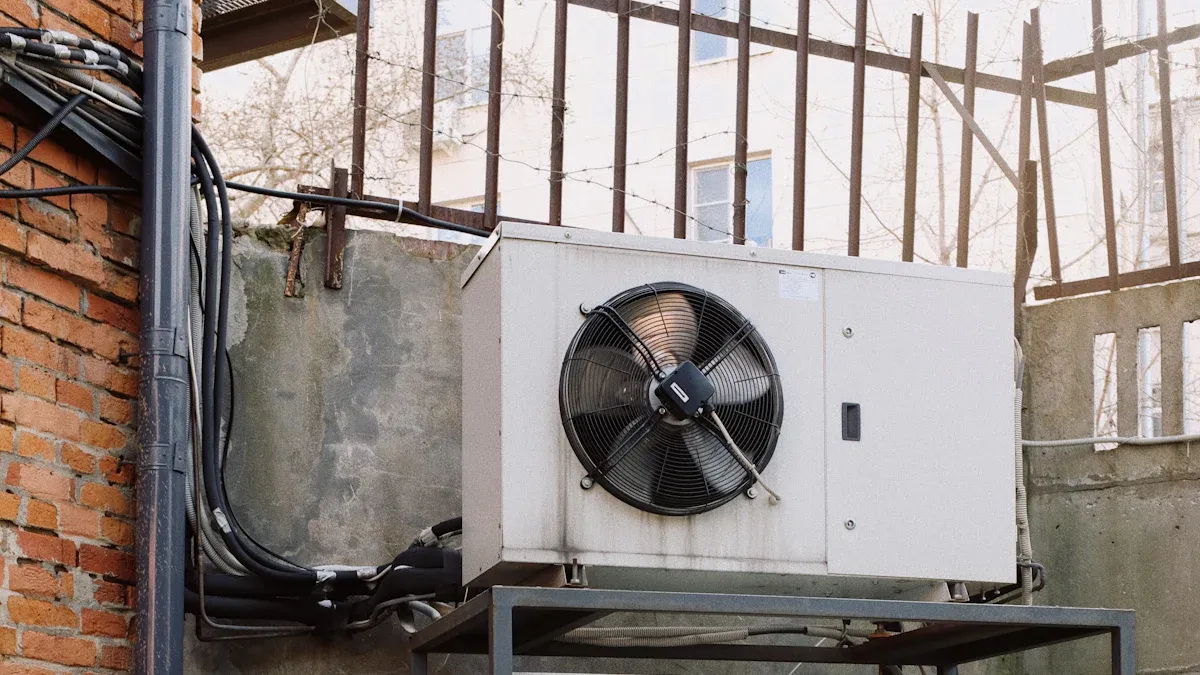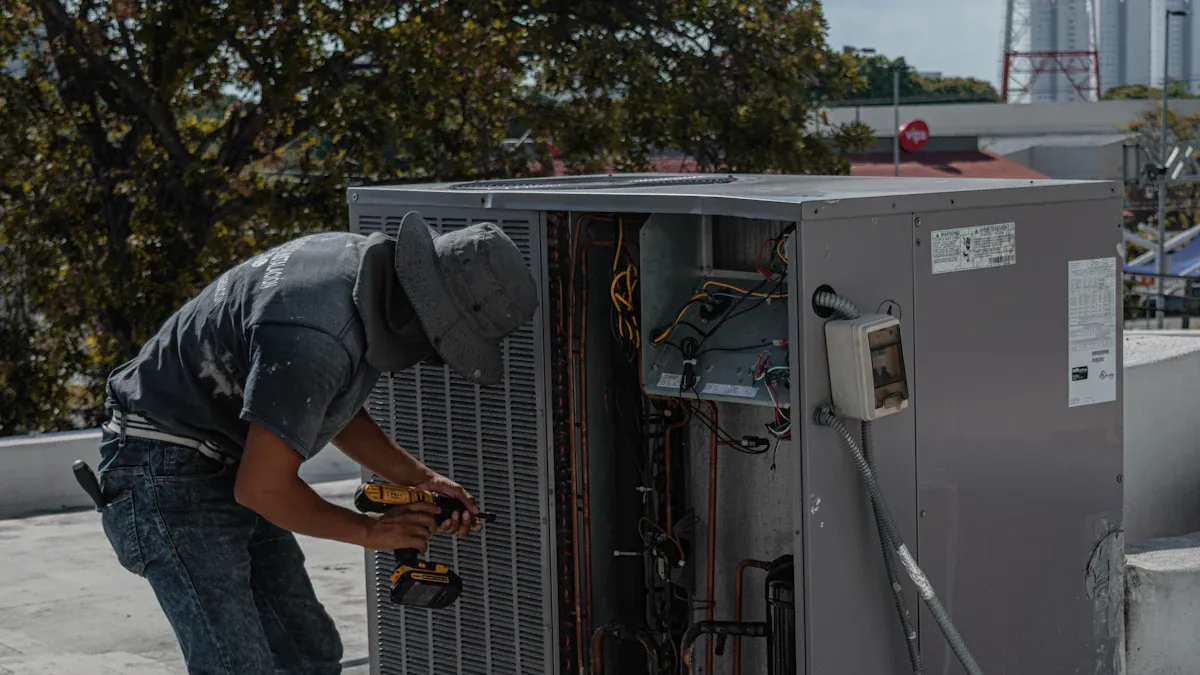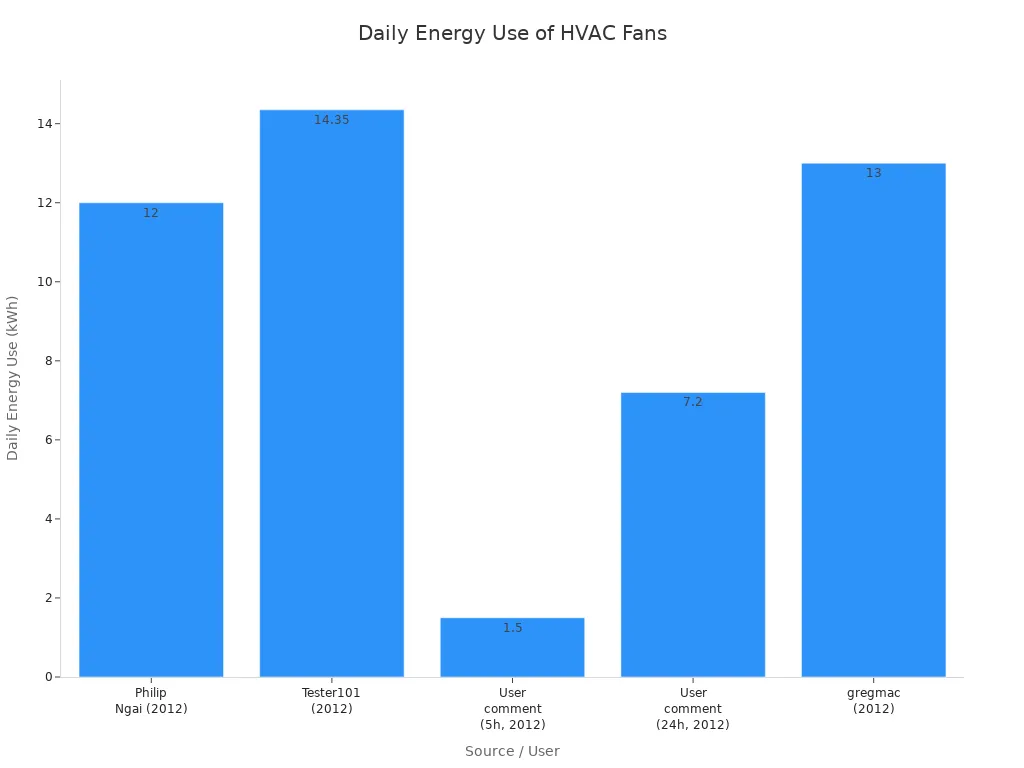Why You Should or Shouldn't Run Your HVAC Fan All the Time

Should you keep your hvac fan on all the time? Many people wonder about this when they want better comfort at home. If you let your hvac fan run nonstop, you will see good and bad things. Some studies say running a fan can help cool you down. It does this by moving heat away from your body. This may help stop health problems from too much heat. But there are also risks. You could get too hot or lose water from your body. This is more likely if it gets hotter or more humid.
Key things you should think about are:
energy costs
how well your hvac works
indoor air quality
humidity levels
noise from the fan
extra wear on the hvac system
You need to think about these things to choose what is best for your home.
Key Takeaways
Running your HVAC fan all the time moves air better. It helps keep the temperature the same in your home. - If you use the fan all the time, it can clean the air more. It can catch dust, pollen, and pet hair more often. - Using the fan nonstop can make your energy bills go up. It can also wear out your HVAC system parts faster. - Change filters often and get maintenance to keep your system working well. This also helps keep your air clean. - Smart thermostats and new HVAC systems can help you stay comfy. They also help with air quality and save energy.
HVAC Fan Benefits
Better Air Circulation
You want your home to feel nice and fresh. Running your hvac fan all the time helps move air everywhere. This steady airflow stops the air from getting old or stuffy. When you set your ac fan to "on," air keeps moving. This helps cool and warm air spread out more evenly. The table below shows how running the fan all the time is different from using auto mode in a normal air conditioning system:
Feature | Continuous Fan Operation ('On') | Auto Mode |
|---|---|---|
Air circulation | Air moves all the time, so rooms feel less hot or cold and air spreads better | Air only moves during heating or cooling, so it can get stuffy between cycles |
Air filtration | Air goes through filters all the time, so it catches more dust and helps with allergies | Filters work less because the fan only runs during cycles, so more dust stays in the air |
Energy use | Uses more energy because the fan never stops | Saves energy because the fan only runs during cycles |
Filter wear | Filters get dirty faster and need to be changed more often | Filters last longer because air moves less often |
Comfort effects | Can feel chilly in winter but cooler in summer because air always moves | No wind chill, but air can feel stuffy because it does not move as much |
Dehumidification | Not as good at removing moisture because air keeps moving and water can come back | Better at removing moisture because the fan stops and lets water drain |
Equipment wear | Fan motor lasts longer because it does not start and stop a lot | Fan motor wears out faster because it starts and stops more often |
Tip: If you have allergies or pets, running your hvac fan can help catch more dust and pet hair.
Consistent Temperature
Some rooms may feel warmer or colder than others. This happens when your ac fan only runs during cooling. Keeping the fan on helps push air into every room. This makes hot and cold spots go away, even in rooms above garages or far from the ac unit. You get a more even temperature in your house.
Running the hvac fan all the time helps spread cool and warm air.
You will notice less change in temperature between rooms.
The ac fan keeps air moving, so you do not get sudden blasts of hot or cold air.
Your air conditioning system keeps you comfortable more easily.
Many families with kids or allergies like a steady fan because it feels better.
A study found that when the ac turns on and off, the temperature can change a lot. Running the fan all the time helps keep the temperature steady and stops big changes.
Improved Air Quality
Good indoor air is important for your health. A working hvac fan moves air through filters more often. This means your ac system can catch more dust, pollen, and other things. Good airflow stops air from getting old. It also helps remove smells and keeps your home smelling nice.
Groups like ASHRAE and the CDC say good airflow and ventilation help lower the chance of spreading sickness and cut down on indoor pollution. When your ac fan runs all the time, it brings in more outside air and keeps inside air moving. This can help you breathe better, especially if you have asthma or allergies.
Bad hvac systems can make your air dirty and old.
Dirty filters or broken ducts can let in dust and pollen.
Good airflow from your ac fan helps get rid of mold, mildew, and bad gases.
Keeping your ac system working well helps control humidity and keeps your air healthy.
Humidity Control
Humidity can make your home feel sticky or dry. Your hvac system helps by taking out water during cooling. When warm, wet air goes over the ac coils, the system pulls out water and drains it. Some new ac systems use things like two-stage cooling or smart controls to run longer at lower speeds. This helps move air and take out more water.
If you run your hvac fan on low speed, air keeps moving and your system works longer. This can help your dehumidifier pull out more water, even when the cooling is off. You get a more comfortable home all year.
Note: If you live where it is very humid, using your ac fan with a whole-home dehumidifier can keep your home comfy and help stop mold.
Drawbacks of Running Your AC Fan 24/7

Higher Energy Bills
Running your hvac fan all day can make your energy bills go up. When you set your ac fan to "on," it keeps spinning even when your air conditioning or heating is not running. This means your system uses more electricity every hour. On average, you might see your monthly bill rise by $15 to $50, depending on your fan type and local rates. If you have an older single-speed fan, you will likely pay more. Newer variable-speed fans use less power, so the cost is lower.
For example, running your hvac fan 24/7 can use about 360 kWh each month. This adds around $25 to your bill compared to using auto mode. If you only run the fan in auto mode, you might pay about $18 a month. With the fan always on, the cost jumps to about $43 a month. These extra costs can add up over time.
You can see how much electricity different fans use in the table below:
Source / User | Power Consumption (Watts) | Daily Energy Use (kWh) | Notes / Comments |
|---|---|---|---|
Philip Ngai (2012) | ~500 | ~12 | Instantaneous power meter reading; noticeable on electric bill |
Tester101 (2012) | 598 | 14.35 | Calculated: 0.598 kW * 24h = 14.35 kWh/day; 430.56 kWh/month; ~$30/month at $0.07/kWh |
User comment (2012) | 300 | 1.5 (for 5 hours) | 300W for 5 hours = 1.5 kWh; continuous operation would be proportionally higher |
User comment (2012) | 300 | ~7.2 | Estimated continuous use at 300W motor power |
gregmac (2012) | 500-600 | ~12-14 | Fan draws 4.4 to 5.2 amps at 115V, roughly 500-600W |

Increased Wear and Tear
When you run your ac fan all the time, the parts inside your hvac system work harder. The motor spins for many more hours each day. Over time, this can cause more problems with your equipment. You may need to replace the fan motor or other parts sooner than if you used auto mode. Older systems with single-speed fans often break down faster when used nonstop. You might also see more maintenance bills.
If your hvac system is new and has a variable-speed fan, it can handle longer run times better. Still, every fan has a limit. Using it 24/7 means more wear and tear. You should check your system often and keep up with regular maintenance to avoid big problems.
Noise and Comfort Issues
Some people notice more noise when the ac fan runs all day. The sound of moving air or the fan motor can bother you, especially at night. If your air conditioning system is older, the noise might be louder. Newer systems tend to run more quietly, but you may still hear the airflow.
You might also feel drafts or cool air blowing when you do not want it. This can make some rooms feel chilly, especially in winter. Some homeowners report uneven temperature in their homes, even with the fan running. You may also notice higher energy bills and more risk of breakdowns with older systems.
Tip: If you find the noise or drafts too much, try switching your ac fan to auto mode during the night or when you are not home.
Possible Air Quality Concerns
Running your hvac fan 24/7 can help with airflow and air cleaning, but it can also cause some air quality issues. If you live in a humid area, the fan may blow air over a wet cooling coil. This can put moisture back into your home and make the air feel damp. High humidity can lead to mold or mildew problems.
Your air filter will also fill up with dust and debris faster. If you do not change or clean the filter often, your air conditioning system will not work as well. Dirty filters can let dust, pollen, and even mold spores back into your home. Some electronic air cleaners can also make ozone or other by-products that may hurt indoor air quality.
Running the ac fan all the time can:
Increase indoor humidity in some climates.
Cause filters to clog faster, lowering airflow and system efficiency.
Spread bacteria or mold if filters are not changed often.
Make air quality worse if you skip regular maintenance.
Note: You should check your filters every month and replace them as needed. This helps keep your hvac system running well and your air clean.
When Running Fan Makes Sense
Allergy or Pet Concerns
If you have allergies or pets, you might think running your hvac fan all the time will help. It seems like more air movement would catch more dust and pet hair. However, most professionals suggest using the 'auto' mode instead. When you run the fan nonstop, it can stir up dust and allergens, making them move around your home. This can make allergy symptoms worse. You should use high-quality filters and change them often. Some smart thermostats let you run the fan for short periods, even when your system is not heating or cooling. This helps clean the air without spreading allergens all day.
Tip: Use a smart thermostat to set your fan to run for a few minutes every hour. This keeps air moving through the filter and helps control pet dander.
Advanced HVAC Systems
Modern homes often have advanced hvac systems. These systems use special motors and smart controls. Variable-speed fans and electronically controlled motors let the fan run at lower speeds. This means you get better air movement and comfort, but you use less energy. You also hear less noise. These systems keep your home at a steady temperature and help clean the air. You may need to change your filter more often, but you get better air quality and comfort.
Variable-speed fans give you:
Even temperatures in every room
Quieter operation
Lower energy bills
Better air cleaning
If you have an older system, running the fan all the time can use more power and wear out the motor faster. In that case, 'auto' mode works better for saving energy.
Home Layout and Ductwork
The way your home is built and how the ducts are set up matter a lot. If your ductwork is well-designed, sealed, and the right size, running the fan can help keep every room comfortable. Air moves smoothly, and you do not waste energy. Homes with straight, insulated ducts and good register placement see the best results. If your ducts have leaks or lots of bends, you might get uneven temperatures and higher bills. You should fix leaks and make sure your ducts are clean before using the fan all the time.
Ductwork Feature | Effect on Continuous Fan Use |
|---|---|
Well-sealed, straight | Even airflow, better comfort |
Leaky or bent | Uneven temps, wasted energy |
Proper register placement | Good air movement in all rooms |
Note: If your ducts run through a hot attic, running the fan may pull in hot air during summer. Always check your ductwork before using the fan nonstop.
Tips for Using Your HVAC Fan
Adjusting Settings
You can get the most out of your ac by learning how to set your thermostat. The 'AUTO' setting works best for saving energy because the fan only runs when your ac or heater is on. This helps lower your home energy usage and keeps your bills down. The 'ON' setting keeps the fan running all the time. This can help with air circulation and may improve comfort, especially if you have allergies or pets. Some homes in humid areas also benefit from this setting. Remember, running the fan nonstop can raise your energy costs and may wear out the motor if it is not built for constant use.
Tip: If you are not sure which setting is right for your home, talk to an ac professional. They can help you balance comfort and efficiency.
Maintenance Advice
Keeping your ac in good shape is important, especially if you run the fan often. You should check your filters every month. If you have pets or allergies, you may need to change them every 30 days. Clean filters help your ac work better and keep your air clean. You should also have a technician check your system once a year. They will look at the blower motor, test the thermostat, and clean the coils. These steps help your ac last longer and prevent breakdowns.
Maintenance Task | How Often | Why It Matters |
|---|---|---|
Check/change filters | Every 1-2 months | Keeps air clean and system efficient |
Professional inspection | Once a year | Prevents problems and saves money |
Clean coils | Annually | Improves cooling and airflow |
Monitoring Energy Use
You can track how much energy your ac fan uses with smart tools. Devices like Smappee or MeterPlug show real-time data on your phone. Smart thermostats also help you see patterns in your home energy usage. You can compare your electric bills from month to month to spot changes. Many utility companies offer online calculators to estimate costs. These tools help you decide if running your fan all the time makes sense for your budget.
Note: Watching your energy use helps you make smart choices and avoid surprises on your bill.
If you run your HVAC fan all the time, it depends on your house and what you like. The type of system you have also matters. Think about these things:
Running the fan all the time can help clean the air. It can also make the temperature in your house more even, which is good for homes with more than one floor.
You might pay more for electricity or hear more noise. This happens more with older systems.
Changing filters and doing regular checkups keeps your system working well.
If you are not sure what to do, ask a local HVAC expert for help. You can also use smart thermostat tools to pick the best setting. What matters most is that you feel comfortable and save money.
FAQ
Can running my HVAC fan all the time help with allergies?
Yes, running your fan can help trap more dust and pollen in the filter. You should use a high-quality filter and change it often. This keeps the air cleaner and helps you breathe easier.
Will my energy bill go up if I keep the fan on?
You will likely see higher energy bills if you run the fan nonstop. The fan uses electricity every hour it runs. You can check your bill each month to see the difference.
Does running the fan all the time wear out my HVAC system faster?
Yes, running the fan all day puts more hours on the motor. This can lead to more repairs or a shorter lifespan for the fan. You should schedule regular maintenance to keep your system in good shape.
Is it okay to run the fan during winter?
You can run the fan in winter to keep the temperature even in every room. Some people feel chilly from the moving air. Try using the "auto" setting if you feel too cold.
How often should I change my air filter if I run the fan all the time?
You should check your filter every month. If it looks dirty, replace it right away. Most homes need a new filter every 1-2 months when the fan runs nonstop.
See Also
Selecting The Best Cross Flow Fan For Your Needs
The Importance Of Centrifugal Fans In HVAC And Industry
Benefits Of Using LONGWELL Forward Centrifugal Fans For Efficiency